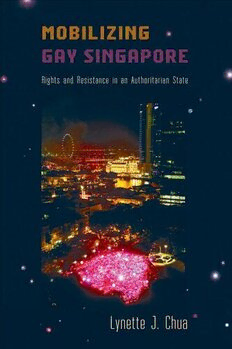
Mobilizing gay Singapore : rights and resistance in an authoritarian state PDF
Preview Mobilizing gay Singapore : rights and resistance in an authoritarian state
Mobilizing Gay Singapore In the series Sexuality Studies, edited by Janice Irvine and Regina Kunzel Also in this series: Thomas A. Foster, Sex and the Founding Fathers: The American Quest for a Relatable Past Colin R. Johnson, Just Queer Folks: Gender and Sexuality in Rural America Lisa Sigel, Making Modern Love: Sexual Narratives and Identities in Interwar Britain Mobilizing Gay Singapore Rights and Resistance in an Authoritarian State Lynette J. Chua Temple University Press Philadelphia TemPLe UnIveRSITy PReSS Philadelphia, Pennsylvania 19122 www.temple.edu/tempress Copyright © 2014 by Temple University All rights reserved Published 2014 Library of Congress Cataloging-in-Publication Data Chua, Lynette J., 1977– mobilizing gay Singapore : rights and resistance in an authoritarian state / Lynette J. Chua. pages cm. — (Sexuality studies) Includes bibliographical references and index. ISBn 978-1-4399-1031-3 (cloth : alk. paper) — ISBn 978-1-4399-1033-7 (e-book) 1. Gay rights—Singapore. 2. Gays—Political activity—Singapore. 3. Gay liberation movement—Singapore. I. Title. HQ76.8.S55C48 2014 323.3'264095957—dc23 2013043280 The paper used in this publication meets the requirements of the American national Standard for Information Sciences—Permanence of Paper for Printed Library materials, AnSI Z39.48-1992 Printed in the United States of America 2 4 6 8 9 7 5 3 1 In loving memory of Catherine L. Brown Contents Preface and Acknowledgments ix 1 mobilizing Gay Rights under Authoritarianism 1 2 Legal Restrictions, Political norms, and Being Gay in Singapore 26 3 Timorous Beginnings 45 4 Cyber Organizing 63 5 Transition 79 6 Coming Out 98 7 mobilizing in the Open 118 8 Pragmatic Resistance, Law, and Social movements 146 Appendix A: Research Design and methods 169 Appendix B: Study Respondents: Singapore’s Gay Activists 179 Appendix C: Singapore’s Gay movement Organizations and major events 186 notes 187 References 197 Index 211 Preface and Acknowledgments Living in this country is like drinking bubble tea1 with a normal straw. you just have to suck extra hard, and finally you get to the pearl! (Stella, gay activist in Singapore) As this book went to press, gay activists in Singapore waited for the country’s highest court to rule on the constitutionality of Section 377A of the Penal Code, the provision that criminalizes sexual conduct between men. The cases of Tan Eng Hong v. Attorney-General (2013) and Lim Meng Suang and Kenneth Chee Mun-Leon v. Attorney-General (respectively, Tan Eng Hong 2013 and Lim Meng Suang) mark one of the first attempts to claim gay rights through the judicial branch of the de facto one-party state.2 But it is by no means the first milestone for Singapore’s gay movement. Gay activists’ endeavors in Singapore stretch beyond the courtrooms and reach back in time nearly twenty years. The currently pending lawsuits are only one important step in their struggles for justice and equality in a state where law is used to stifle basic civil-political liberties, hamper collective mobilization, and control political dissent. Speaking out in Singapore, especially in the form of collective action, is seen as resistance against the ruling powers, regardless of how that resistance is carried out and what it concerns. Although law is central to the tactics of Singapore’s gay movement, few of its actions have focused on litigation or other forms of public contestation through formal political institutions. In this book, therefore, I provide an
